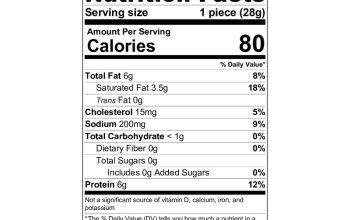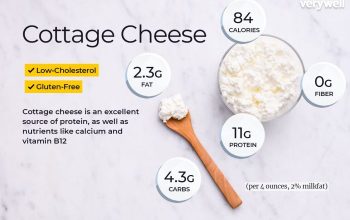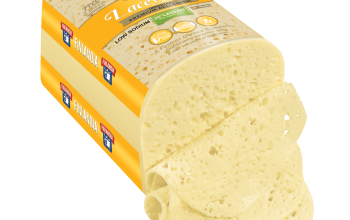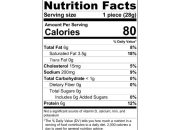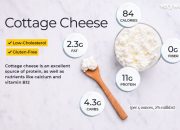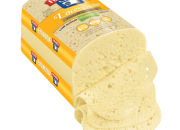Mozzarella Cheese in Culinary Applications and Health Impacts
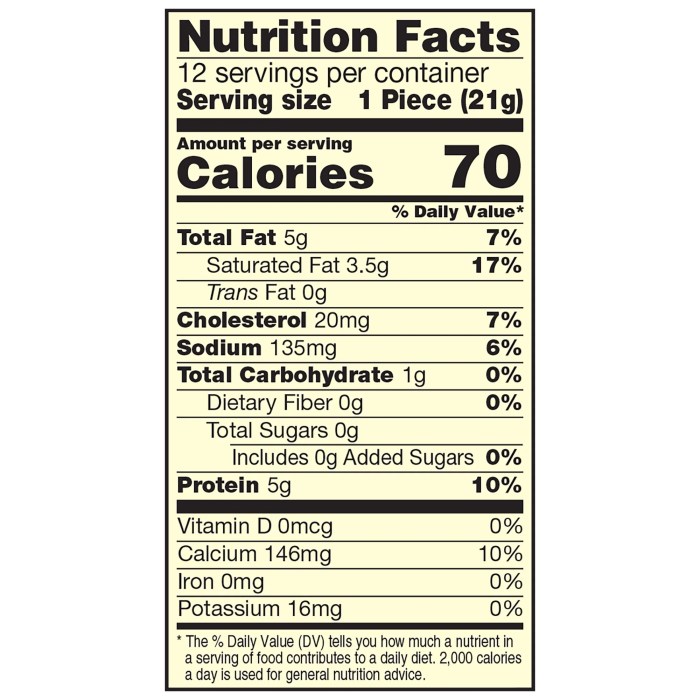
Nutrition facts of mozzarella cheese – Mozzarella cheese, with its creamy texture and mild flavor, is a culinary staple enjoyed worldwide. Its versatility allows for incorporation into a wide array of dishes, each impacting its nutritional profile differently. Understanding these variations is crucial for making informed dietary choices.Mozzarella’s nutritional content, primarily composed of protein and fat, can be significantly altered by the cooking method and accompanying ingredients.
While it offers calcium and protein, the addition of high-fat ingredients or deep-frying can drastically increase the overall calorie and fat content of a dish.
Recipes Using Mozzarella Cheese and Their Nutritional Implications
Several popular recipes utilize mozzarella, showcasing its versatility but also highlighting the potential for nutritional variations. A simple Caprese salad, featuring fresh tomatoes, basil, and mozzarella, provides a relatively low-calorie, high-antioxidant option. Conversely, a deep-fried mozzarella stick adds significant saturated fat and calories due to the breading and frying process. A classic Margherita pizza, while delicious, can be high in sodium and carbohydrates depending on the crust and sauce.
The nutritional impact of each recipe depends heavily on the specific ingredients and preparation methods employed.
Let’s illuminate the nutritional landscape of mozzarella cheese, a dairy delight often gracing our plates. Understanding its calcium and protein content is crucial, but comparing it to other cheeses offers valuable insight. For instance, checking the detailed breakdown available at babybel cheese nutrition info helps us appreciate the variations in fat and sodium across different cheese types.
Returning to mozzarella, remember to always consider portion size for a balanced diet.
Effects of Cooking Methods on Mozzarella Cheese Nutrition
The cooking method profoundly affects mozzarella’s nutritional value. Baking mozzarella, as in a pizza or lasagna, generally preserves its protein and calcium content. However, the added ingredients, such as processed meats or high-fat sauces, can negatively influence the overall nutritional profile. Frying, on the other hand, drastically increases the fat content due to oil absorption. This significantly raises the calorie count and adds saturated fat, potentially impacting cardiovascular health.
Grilling mozzarella can be a healthier alternative, minimizing added fat while retaining the cheese’s protein and calcium.
Nutritional Comparison of Mozzarella Cheese in Different Dishes
| Dish | Calories (per serving) | Fat (g) | Saturated Fat (g) | Sodium (mg) | Protein (g) | Calcium (mg) |
|---|---|---|---|---|---|---|
| Caprese Salad (small serving) | 150-200 | 10-15 | 5-8 | 100-200 | 10-15 | 200-300 |
| Margherita Pizza (slice) | 250-350 | 15-25 | 8-15 | 400-600 | 8-12 | 150-250 |
| Lasagna (serving) | 300-450 | 20-30 | 10-20 | 500-800 | 15-20 | 250-400 |
| Fried Mozzarella Sticks (serving) | 400-500 | 30-40 | 15-25 | 400-600 | 10-15 | 150-250 |
*Note: These values are estimates and can vary significantly based on specific recipes, portion sizes, and ingredient brands.*
Health Benefits and Risks Associated with Mozzarella Cheese Consumption: Nutrition Facts Of Mozzarella Cheese
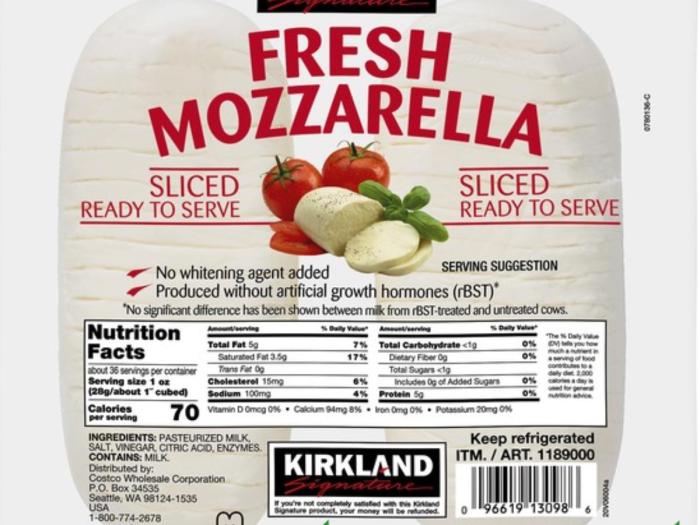
The creamy allure of mozzarella, its melt-in-your-mouth texture, and its versatile nature in culinary applications often overshadow a deeper consideration: the intricate dance between its health benefits and potential drawbacks. Understanding this balance is crucial for incorporating mozzarella into a healthy and balanced diet. While seemingly innocuous, the truth about mozzarella, like a well-guarded secret recipe, reveals both nourishing and potentially problematic aspects depending on consumption patterns.Mozzarella cheese, when consumed in moderation, offers several nutritional advantages.
Its primary contributions lie in its calcium and protein content.
Nutritional Benefits of Mozzarella Cheese
Mozzarella is a good source of calcium, a vital mineral for maintaining strong bones and teeth, preventing osteoporosis, and supporting muscle function. A single serving can contribute significantly to the recommended daily calcium intake. Furthermore, it provides a decent amount of protein, essential for building and repairing tissues, producing enzymes and hormones, and supporting immune function. The protein in mozzarella contributes to satiety, helping to manage appetite and potentially aiding in weight management when part of a balanced diet.
Think of it as a tiny, delicious building block for a healthier you.
Potential Health Risks of Excessive Mozzarella Consumption
However, the story takes a slightly darker turn when mozzarella consumption becomes excessive. The cheese’s richness lies in its high saturated fat content. Excessive saturated fat intake is linked to increased levels of LDL (“bad”) cholesterol, a major risk factor for heart disease. Similarly, mozzarella, particularly commercially produced varieties, often contains a significant amount of sodium. High sodium intake is associated with high blood pressure and an increased risk of stroke.
Imagine a delicious, but slightly treacherous, culinary enigma. The key, as with most things in life, is moderation.
Comparison of Benefits and Risks, Nutrition facts of mozzarella cheese
The impact of regular mozzarella consumption hinges on portion control and the overall dietary context. Consider the following points:
- Benefit: Provides calcium essential for bone health and muscle function.
- Risk: High saturated fat content can contribute to elevated cholesterol levels.
- Benefit: Offers protein for tissue repair and satiety.
- Risk: High sodium content can increase blood pressure.
- Balance: Incorporating mozzarella as part of a balanced diet, with controlled portions, can maximize benefits while minimizing risks. Think of it as a carefully orchestrated culinary waltz, where each step is considered.
FAQ Guide
Is mozzarella cheese good for weight loss?
Mozzarella cheese can be part of a weight-loss diet in moderation. Choose low-fat or part-skim varieties and be mindful of portion sizes due to its calorie and fat content.
Can I eat mozzarella cheese if I’m lactose intolerant?
Lactose intolerance varies in severity. Some individuals can tolerate small amounts of mozzarella, while others may experience digestive discomfort. Lactose-free mozzarella options are available.
Does mozzarella cheese raise blood pressure?
Yes, mozzarella cheese contains sodium, which can contribute to high blood pressure. Individuals with hypertension should consume it in moderation.
Is mozzarella cheese a good source of protein?
Yes, mozzarella cheese is a good source of protein, contributing to satiety and muscle building. However, the exact protein content varies depending on the type of mozzarella.

